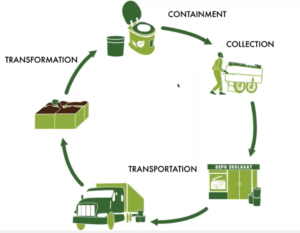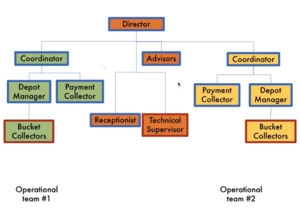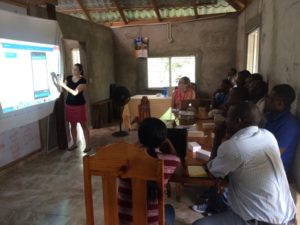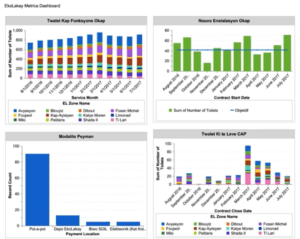
Search
Thank you to Erica Lloyd, Systems Director, and Shannon Smith, Sales and Marketing Advisor, at SOIL Haiti for sharing their story of how they’ve digitized their sales and service activities to scale their ecological sanitation (EcoSan) operations in Haiti! Read our webinar recap below, or watch the full webinar for more details.
SOIL is working to create a social business model for providing access to safe, dignified and ecological sanitation that produces rich, organic compost as a natural resource for Haiti’s badly-depleted soils, while also creating economic opportunities in some of the world’s most under-resourced communities. Watch their BBC video spotlight.

Their EcoSan service includes transforming waste into compost with the EkoLakay compost toilet service. The compost toilet has a removable bucket that is collected weekly by SOIL staff, transported to their treatment site, emptied, cleaned and then returned to the household. The waste is then transformed into agricultural grade compost.
SOIL field staff sell to households in Port-au-Prince and Cap Haitien in Haiti. To date, SOIL has distributed toilets to over 1,000 families and plans to scale its EcoSan efforts further.
Prior to TaroWorks, all of these activities were tracked using pen and paper and eventually transcribed into an Excel spreadsheet. This system worked pretty well when they had 100 customers but when they expanded to 500, it became clear that their ability to scale was limited by their lack of an integrated, flexible, and mobile data management system.
One issue with pen and paper was the time lag. Field agents often didn’t have the latest information when they interacted with the customers in real-time. Management didn’t have the data to analyze and refine their EcoSan model as they move toward financial sustainability. Finally, none of their data was interconnected because different data was saved on different spreadsheets, which led to challenges in finding relationships between the data (e.g., linking payment and complaint information).

SOIL is structured around two operational teams for each city, each with a coordinator, depot manager, payment collector, and 3-4 bucket collectors. These teams manage a group of neighborhoods. A program director, advisors, receptionist and technical supervisors support these two operational teams.
Of these team members, everybody but the bucket collectors and technical supervisor is currently using Salesforce and TaroWorks. The technical supervisors and bucket collectors will be using the system in the coming year.
When SOIL decided they needed a technology system to scale, they knew they needed two main things.
SOIL now uses TaroWorks for all of their EcoSan sales and service processes including:
Their focus next year will be jobs to improve logistics (tracking location of buckets) and managing their toilet inventory.

It’s really important to put in the upfront investment to help the team learn the tools and technology. Some of their field staff had never used smartphones so they spent time getting people comfortable with the phones. They also created a robust training curriculum that was interactive, fun and immersive. They created a safe space to role play, ask questions and go through the steps with each other before they went “live.” For a deep-dive on how SOIL designed their training, see the Q&A of their training process.
The investment has paid off because the team has fully embraced the system. In the beginning Erica was driving all of the job design and set-up. Now, they have broad ownership across the organization of people building their own TaroWorks jobs and dashboards. The field staff are getting involved too, actively suggesting jobs that will make their work easier.
Shannon shared how the data is used by the program director to make decisions about marketing and overall business strategy. As a relatively new Salesforce user, she’s learned to take the reins and create reports and dashboards herself.
In her experience with the system, she’s noticed that the field staff are having more “fun” interacting with customers because they’re more empowered with information and more data is being logged – in a more consistent manner.
She shared some of the insights they’ve gained so far:
How did they get to these insights? Salesforce dashboards!
Dashboards like the example below are shared across the program director, country directors, and board members so they can all see the progression of the project over time. In some cases, the data shows the reason for fluctuations, and in other cases, it gives enough information for the country director to follow up with the field team about results. SOIL management also regularly reviews performance metric dashboards for their payment collectors.

Other information and data analysis is more strategic. Shannon gave the example of tracking the methods customers use to make payments. They’re currently interested in switching to more mobile payments, so there is less follow-up for payment collectors, so they’re watching the results of the payment mode question closely.
The above dashboards are reviewed about monthly because they are ongoing indicators. Another category of analyses they conduct is for ad hoc and one-off surveys, which management reviews faster because the research is time-sensitive. A survey that the payment collectors pro-actively suggested tracked conversion rates of existing clients to switch to mobile payments. They’re monitoring results now, to see what factors help increase conversion (i.e. payment collector, region, phone service, etc.).
Another example of these are customer satisfaction surveys, which use the Net Promoter Score to determine satisfaction. Because of the interconnected nature of the system, management can quickly find a dissatisfied customer and review their history to see if there are any clues to their dissatisfaction.
With so many operations digitized and field agents who are engaged in the whole process, we asked SOIL what advice they have for other organizations thinking about using similar systems for sanitation.
The first thing they did during training was to ask participants what pain they experienced with pen and paper. As the feedback came rolling in, they realized that they just needed to position the system as an opportunity to resolve these issues, instead of starting out with “you must learn this new system.”
Trust is hugely important for successful adoption. That means “test test test test” so jobs will work as expected before field staff start using them.
SOIL kept training sessions on the use of their mobile and cloud-based tools simple with lots of interaction and practice. A few special touches they enacted included having participants locate “clients” around the office using the GPS locator where the “client” ended up being a balloon with candy. Additionally, they offered a TaroWorks completion certificate because that is a big motivator in Haiti.
Use TeamViewer to 1) show your mobile device screen on a projector so participants can see before trying themselves, and 2) to remote control a field agent’s device when they’re in the field.
Check out more about SOIL at www.oursoil.org.
POST TOPICS
Sign up to receive emails with TaroWorks news, industry trends and best practices.
TaroWorks, a Grameen Foundation company.
Site by V+V